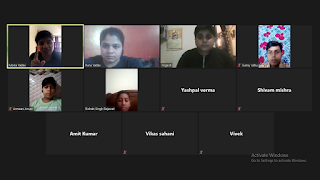“What I learnt from this workshop is what to do when I am not feeling okay or sad. I used to very confused, didn’t know what to do but now if I am upset, I know how to process it or what can work for me”
While
we unanimously believe and emphasis on the importance of physical health and
well-being, mental health is mostly neglected, taken for granted and
conversations around it is stigmatized. In our households, society, schools we
are told multiple times to be happy, not get angry or don’t be sad, there is
really no space to allow young kids to process and share their thoughts, emotions
and feelings. The situation is more grim during COVID-19 where the children are
confined to their homes, can’t go to school, meet friends, play games and
somehow parents are always there so if they don’t like something or get angry
they have nowhere to go which is impacting their mental well-being in a very
serious way. Also, what will you do or cope with stress, anger, irritation or
loneliness when you don’t feel supported externally.

The
session on ‘How are you feeling?’ with the adolescent students of Government
school began with a simple meditation practice with deep breathing taking a
moment for themselves and centering oneself. After writing about an experience
where they felt sad, unhappy, upset or feeling overwhelmed we engaged on
various coping mechanism they employ to get through hard times. Some very
interesting anecdotes were shared
‘I
go close to the nature’
‘Whenever
I feel down, I try to remember memory of good times’
‘I
go out and play with my friends’
‘I
share my worries with my parents’
‘I
think about my future and try to let go of bad feelings’
In the next part of the session, we provided them
with various tools for coping with stressful situations. First being positive
self-talk; here the participants were invited to share 5 good things about
themselves. It was beautiful to see them write so religiously about things they
like about themselves. To say these beautiful things about oneself loudly and
remembering them during the stressful times could be very helpful.
This was followed by drawing, sketching or just
writing a dream that you see for yourself uninhabited, without thinking or
caring for anyone else – something for yourself. Every time you face an
obstacle, you think about this dream and never give up. People, friends will
come and go; parents may or may not support your dreams. It’s important to know
that you have this precious life to live; your dream is bigger than anything
else. You can do this.
Such
beautiful, out of box dreams came up, none of them were expected or socially
desirable dreams –
‘I
love singing, so I want to become singer’
‘I
love playing cricket, not a day goes by when I don’t play it. I want to play
for Team India one day’
‘I
want to be a scientist at ISRO’
Two
of the students drew their dreams, very skillful and artistic. We took this
moment to invite the participant who wishes to be singer one day to sing for us
if he wants too! Wow, melodious is just an understatement for how amazing he
sang.
Journaling is another very useful skill; diary is
like a mirror and a friend who will always hear you. We invited participants to
write about the best/most beautiful day of your life or would like to have a
day like that! You can keep a diary which can be a mirror for you where you can
write all good, bad things you are going through. This can be the first step in
dealing with a difficult experience.
Since
this was also our last workshop, we invited the participants to ask questions
from any of the sessions conducted before along with this one.
“Do
we feel irritated or frustrated because of these physical changes happening to
us?”
“Will
the discrimination against hijras ever end?”
“Parents
keep telling us to work hard; many a times we do good things too but they
remind us to do better. Is that really okay?”
“Will
kinnar be always kinnar?”
During
the last part of the workshop, we invited the participants to share their
feedback around the sessions with us –
“I
enjoyed all the activities they were fun, helped me to understand the things”
“I
learnt that we must not discriminate people because of who they are or what
they do. We should respect others and not judge them for their gender or from
where they come from”
“I
understood that we should not touch anyone inappropriately; that’s not okay!
And if someone tries to abuse me, I should say No, run away from there and seek
support from trusted adult”
“I
learnt a lot of things about growing up that I didn’t know before, so many
questions were answered”
These
participants were amazing, open, honest and eager to learn new things. What a
wonderful experience.














